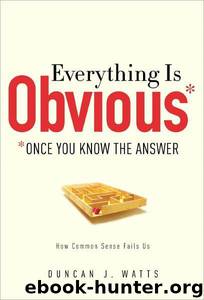Everything Is Obvious: *Once You Know the Answer by Duncan J. Watts

Author:Duncan J. Watts
Language: eng
Format: mobi, epub
Tags: Non-Fiction
ISBN: 9780385531696
Publisher: Crown Business
Published: 2011-03-29T00:00:00+00:00
FUTURE SHOCK
No matter how carefully you adhere to this advice, a serious limitation with all prediction methods is that they are only reliable to the extent that the same kind of events will happen in the future as happened in the past, and with the same average frequency.13 In regular times, for example, credit card companies may be able to do a pretty good job of predicting default rates. Individual people may be complicated and unpredictable, but they tend to be complicated and unpredictable in much the same way this week as they were last week, and so on average the models work reasonably well. But as many critics of predictive modeling have pointed out, many of the outcomes that we care about most—like the onset of the financial crisis, the emergence of a revolutionary new technology, the overthrow of an oppressive regime, or a precipitous drop in violent crime—are interesting to us precisely because they are not regular times. And in these situations some very serious problems arise from relying on historical data to predict future outcomes—as a number of credit card companies discovered when default rates soared in the aftermath of the recent financial crisis.
Even more important, the models that many banks were using to price mortgage-backed derivatives prior to 2008—like the infamous CDOs—now seem to have relied too much on data from the recent past, during which time housing prices had only gone up. As a result, ratings analysts and traders alike collectively placed too low a probability on a nationwide drop in real-estate values, and so badly underestimated the risk of mortgage defaults and foreclosure rates.14 At first, it might seem that this would have been a perfect application for prediction markets, which might have done a better job of anticipating the crisis than all the “quants” working in the banks. But in fact it would have been precisely these people—along with the politicians, government regulators, and other financial market specialists who also failed to anticipate the crisis—who would have been participating in the prediction market, so it’s unlikely that the wisdom of crowds would have been any help at all. Arguably, in fact, it was precisely the “wisdom” of the crowd that got us into the mess in the first place. So if models, markets, and crowds can’t help predict black swan events like the financial crisis, then what are we supposed to do about them?
A second problem with methods that rely on historical data is that big, strategic decisions are not made frequently enough to benefit from a statistical approach. It may be the case, historically speaking, that most wars end poorly, or that most corporate mergers don’t pay off. But it may also be true that some military interventions are justified and that some mergers succeed, and it may be impossible to tell the difference in advance. If you could make millions, or even hundreds, of such bets, it would make sense to go with the historical probabilities. But when facing a decision
Download
Everything Is Obvious: *Once You Know the Answer by Duncan J. Watts.epub
This site does not store any files on its server. We only index and link to content provided by other sites. Please contact the content providers to delete copyright contents if any and email us, we'll remove relevant links or contents immediately.
The Art of Thinking Clearly by Rolf Dobelli(8917)
The 5 Love Languages: The Secret to Love That Lasts by Gary Chapman(8587)
Mindhunter: Inside the FBI's Elite Serial Crime Unit by John E. Douglas & Mark Olshaker(7886)
Becoming Supernatural by Dr. Joe Dispenza(7154)
The Road Less Traveled by M. Scott Peck(6680)
Nudge - Improving Decisions about Health, Wealth, and Happiness by Thaler Sunstein(6679)
Enlightenment Now: The Case for Reason, Science, Humanism, and Progress by Steven Pinker(6442)
Win Bigly by Scott Adams(6352)
Mastermind: How to Think Like Sherlock Holmes by Maria Konnikova(6289)
The Way of Zen by Alan W. Watts(5840)
Factfulness: Ten Reasons We're Wrong About the World – and Why Things Are Better Than You Think by Hans Rosling(4052)
The State of Affairs by Esther Perel(3973)
Gerald's Game by Stephen King(3957)
Man's Search for Meaning by Viktor Frankl(3702)
The Confidence Code by Katty Kay(3606)
Thinking in Bets by Annie Duke(3562)
The Worm at the Core by Sheldon Solomon(2954)
Enlightenment Now by Steven Pinker(2942)
Liar's Poker by Michael Lewis(2841)
